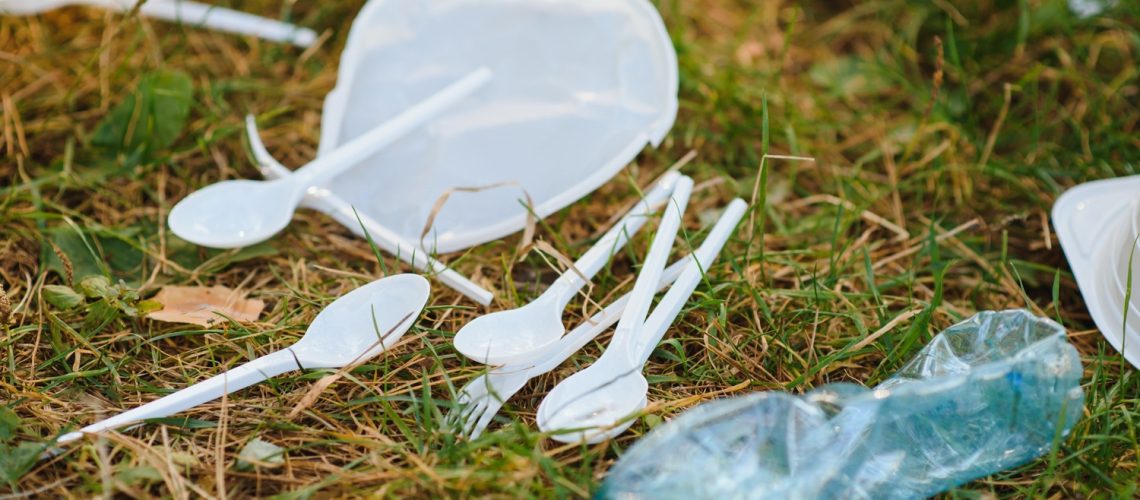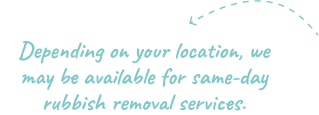On November 1, 2022, the NSW Government introduced a state-wide ban on hazardous single-use plastic items, including plastic straws, stirrers, cutlery, plates and bowls (without lids). It also includes cotton swab sticks, foodware made from expanded polystyrene, and microbeads in personal care products.
This article will outline the key changes, the items affected, how it affects people and businesses daily, and what to do instead.
Aus Rubbish Removals focuses on reducing environmental impact through sustainable waste management processes, including eco-friendly practices such as recycling, and its strong commitment to responsible rubbish removal.
We transport the collected rubbish to recycling facilities where materials are sorted, processed and disposed of responsibly to maximise reuse and minimise waste. Additionally, we provide same-day rubbish removal for domestic, commercial, and construction sites.
What is the NSW Single-Use Plastic Ban?
NSW’s new ban on single-use plastics helps phase out the supply of various single-use plastic items used across the state. From January 1, 2025, plastic products that form part of “integrated packaging” for food and beverages will also be banned.
These are:
Source: NSW EPA
Biodegradable plastics, compostable plastics (certified by Australian standards), and bioplastics are also banned. The ban is part of a wider NSW waste strategy to cut plastic litter by 30% by 2025, reducing plastic waste throughout the state’s environment and waterways.
The government hopes to phase out these single-use items to prevent an estimated 2.7 billion pieces of plastic litter from entering the environment over the next 20 years, directly aiding marine and land ecosystems.
This move is part of broader pledges to adopt a zero-emissions approach to organic waste and improve recycling through campaigns to reduce food scrap waste and the introduction of green bins across the state by 2030.
What Plastics Are Banned in NSW?
Single-use plastic items and packaging account for 60% of all litter in NSW. Below is a table summarising the different types of banned plastics, which lists when they were banned and their implementation dates.
Summary Table of Major Banned Items in NSW
Source: Clean Up Australia
What Plastics Are Still Allowed (For Now)?
Despite NSW’s strict prohibitions on different single-use plastic items, several plastic products can still be supplied under existing laws, at least for now.
These exceptions involve items not incorporated into food/beverage packaging, are reusable, or specifically exempted due to the absence of safe alternatives or medical need.
Plastic Packaging Products Not Yet Prohibited
Plastic cups and containers with lids: Plastic cups, containers and lidded bowls are not banned compared to other single-use plastic plates and bowls without spill-proof lids and cutlery.
Plastic sleeves for straws: The plastic protective sleeves surrounding straws, such as those on juice boxes, are not yet banned but may face a ban in the future.
Plastic produce bags: Unpackaged fruit and vegetable bags made from plastic are banned unless they meet Australian compostable certification standards. Bags that do not meet these specifications will be prohibited in the future.
Plastic barrier bags: Certain single-use plastic barrier bags, such as produce or deli bags, will still be permitted.
Plastic packaging not conforming or sealed by machinery: Items such as screw-on lids, shrink wrap and trays for microwaveable meals are not included because they are not generally part of “integrated packaging” sealed by machinery.
Due to the expansion of the regulations, more plastics will soon be added to the list of banned items.
Who is Affected by the Ban?
The NSW single-use plastic ban applies to a wide group, including businesses, organisations, and consumers who supply, distribute, sell, or use banned plastic items.
Businesses and Organisations
Retail and hospitality: This includes restaurants, cafes, bars, hotels, takeaway food outlets, party supply stores, discount stores, supermarkets, market stalls, and online stores that must not sell banned single-use plastic items.
Manufacturers, suppliers, distributors and wholesalers: These entities will be prohibited from supplying banned plastic items to people in NSW or into NSW, with a penalty for those supplying banned items as part of a business operation and doubling the normal fine.
Community, charity, educational and sporting groups: These are organisations doing activities for charitable, sporting, academic, or community purposes and include events and fundraising.
Industry associations and supply chains: Engagement to communicate information and support compliance across their networks/members.
Consumers
- Single-use plastic straws, stirrers, and cutlery cannot be sold or provided to consumers when they buy goods, including takeaway food, from businesses in NSW.
- People may continue using any banned single-use plastic products for personal use. However, they may no longer supply them through any commercial, organisational or public activity.
- Consumers are urged to use alternatives, such as reusable items or sustainable substitutes, like paper straws or bamboo cutlery.
Groups With Particular Exemptions
Persons with medical needs or disabilities: An exemption allows businesses to continue supplying single-use plastic straws on request to individuals who require them for medical reasons or due to a disability. These straws cannot be displayed but must be available upon request.
For medical, scientific and forensic users: Some single-use plastic products (cotton buds and bowls) may be supplied for medical, scientific or forensic use under exemptions in the EPA.
Reusable plastic: Any item that meets specific durability requirements (for example, being dishwasher safe for a certain number of washes) is exempt from the ban.
Consumers’ daily choices offer possibilities to reduce plastic waste and drive market and governmental behaviour that will lead towards environmental sustainability and the success of plastic bans.
Sustainable Alternatives to Banned Plastic Items
These are practical tips to replace your disposable cutlery and utensils with reusable or compostable alternatives within the mentioned categories, so you can choose an eco-friendly option that aligns with your environmental goals.
Paper Straw Alternatives
- Bamboo straws
- Stainless steel straws
- Glass straws
- Silicone straws
- Sugarcane straws
- Wheat straw and pasta straws
- Biodegradable plant-based plastic straws (PLA)
Wooden Cutlery Alternatives
- Wooden or bamboo cutlery
- Fibre-based cutlery
- Biodegradable cornstarch cutlery
- Edible cutlery made from wheat and flour
- Stainless steel cutlery
Reusable Bag Options
- Cotton and canvas tote bags
- Non-woven polypropylene bags
- Jute bags
- Recycled paper bags
- Silicone or fabric reusable snack bags
- String or mesh bags
Metal Drink Alternatives
- Stainless steel water bottles and cups
- Reusable stainless steel straws
- Glass drinkware
- Metal collapsible straw
Sugar Cane Packaging
- Bagasse packaging
- Sugarcane fibre bioplastics
Compostable Cardboard Containers
- Compostable takeout containers
- Bamboo pulp containers
- Moulded pulp and paperboard containers
Penalties for Non-Compliance
Under the single-use plastic ban, stringent penalties are in place to ensure compliance with the New South Wales Environment Protection Authority (EPA). The agency is responsible for enforcement, including fines and other measures.
Fines For Violating The Plastic Ban
Businesses selling banned single-use plastic items, including lightweight carryout bags, can be fined up to $275,000. The maximum court penalties for corporations are 500 penalty units ($55,000), and 100 penalty units ($11,000) for individuals.
Penalties are doubled for manufacturers, producers, wholesalers or distributors doing business and engaging in prohibited activity concerning banned items. Corporations can face fines of up to 1,000 penalty units ($110,000), and individuals can face penalties of up to 200 penalty units ($22,000). Moreover, people caught discarding small plastic items in public areas could be fined up to $160 on the spot.
NSW EPA uses a progressive enforcement approach, including warnings, official cautions, compliance notices, penalty notices and prosecution for continued or serious breaches. It directs individuals, institutions, and companies to detailed information on identifying prohibited plastics, understanding the ban scope, and stakeholder support for compliance.
Likewise, the organisation conducts education and awareness campaigns to inform businesses and other community groups of their responsibilities under the ban.
How Aus Rubbish Removals Supports Plastic-Free Living
Aus Rubbish Removals focuses on environmentally friendly practices, diverting rubbish from landfills and reducing greenhouse gas emissions. We offer same-day service to remove old stock or packaging responsibly.
Moreover, we advocate for recycling, composting, and disposing of waste properly, and we collaborate with businesses and households to minimise waste production through education and best practices.
We service North Sydney, Manly, Mosman, Sydney CBD, Chatswood, Willoughby, and Hornsby. Call us at 0402 244 036 and get a FREE quote for your rubbish removal jobs, and our team of experienced professionals will be on your property in no time.
Frequently Asked Questions
1. When did the NSW plastic ban start?
On November 1, 2022, the NSW Government implemented its first phase of the plastic ban.
2. Is plastic wrap banned in NSW?
There is no outright ban on plastic wrap in NSW under the current single-use plastics bans.
3. Can businesses still give out plastic cutlery?
No. Under NSW’s single-use plastics ban, businesses will no longer be able to provide plastic cutlery integrated within food and beverage packaging from January 1, 2025.
4. What’s the fine for breaking the plastic ban rules?
For individuals, some penalties for failing to comply with EPA Stop Notices can reach up to $55,000 and $275,000 for corporations. Those penalties may also double for manufacturers and distributors.
5. Are compostable plastics allowed?
The NSW plastic ban doesn’t allow compostable plastics despite their certification.



